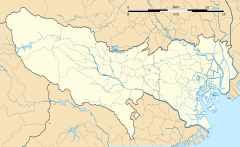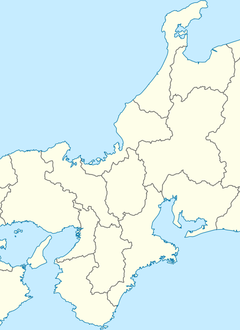Nishi-waseda Station
F11 Nishi-waseda Station 西早稲田駅 | |||||||||||
|---|---|---|---|---|---|---|---|---|---|---|---|
 Entrance No. 1 in July 2008 | |||||||||||
| Japanese name | |||||||||||
| Shinjitai | 西早稲田駅 | ||||||||||
| Kyūjitai | 西早稻田驛 | ||||||||||
| Hiragana | にしわせだえき | ||||||||||
| General information | |||||||||||
| Location | 3-18-2 Toyama, Shinjuku City, Tokyo Japan | ||||||||||
| Coordinates | 35°42′26″N 139°42′33″E / 35.70722°N 139.70917°E | ||||||||||
| Operated by | |||||||||||
| Line(s) | F Fukutoshin Line | ||||||||||
| Distance | 14.6 km (9.1 mi) from Wakoshi | ||||||||||
| Platforms | 1 island platform | ||||||||||
| Tracks | 2 | ||||||||||
| Construction | |||||||||||
| Structure type | Underground | ||||||||||
| Other information | |||||||||||
| Station code | F-11 | ||||||||||
| Website | Official website | ||||||||||
| History | |||||||||||
| Opened | 14 June 2008 | ||||||||||
| Passengers | |||||||||||
| FY2013 | 32,380 daily | ||||||||||
| Services | |||||||||||
| |||||||||||
| |||||||||||
Nishi-waseda Station (西早稲田駅, Nishi-waseda-eki, lit. "West Waseda Station") is a subway station on the Tokyo Metro Fukutoshin Line, in Shinjuku, Tokyo, Japan, operated by the Tokyo subway operator Tokyo Metro. Its station number is F-11. The station opened on June 14, 2008. This station is directly connected to Nishiwaseda Campus of Waseda University in Shinjuku, Tokyo.[1]
Lines
[edit]Nishi-waseda Station is served by the Tokyo Metro Fukutoshin Line between Wakoshi and Shibuya, with many direct through-running services to and from the Seibu Ikebukuro Line and Tobu Tojo Line in the north, and the Tokyu Toyoko Line and Minatomirai Line in the south. The station lies 14.6 km from Wakoshi.
Station layout
[edit]The station has one underground island platform located on the third basement ("B3F") level, serving two tracks.
Platforms
[edit]| 1 | F Fukutoshin Line | for Shinjuku-sanchome and Shibuya TY Tokyu Toyoko Line for Jiyugaoka and Yokohama |
| 2 | F Fukutoshin Line | for Ikebukuro and Wakoshi TJ Tobu Tojo Line for Kawagoeshi and Shinrinkoen |
-
Entrance No. 3 in June 2008
-
The platforms in June 2009
History
[edit]The station opened on 14 June 2008 with the opening of the Fukutoshin Line from Ikebukuro to Shibuya.[2]
Passenger statistics
[edit]In fiscal 2013, the station was the 105th-busiest on the Tokyo Metro network with an average of 32,380 passengers daily.[3] The passenger statistics for previous years are as shown below.
| Fiscal year | Daily average |
|---|---|
| 2011 | 26,535[4] |
| 2012 | 28,326[5] |
| 2013 | 32,380[3] |
Surrounding area
[edit]- Toyama area
- Ōkubo area
- Totsuka (Waseda) and Takadanobaba area
- Toyama Park
- Shinjuku Sports Center
- Gakushuin Women's College, a private school
- Gakushuin Girls' Junior and Senior High School, a private school
- Toyama High School, a public school
- Nishi-Waseda Junior High School, a public school
- Waseda University School of Science and Engineering, Nishi-Waseda Campus in Ōkubo
See also
[edit]References
[edit]- ^ "西早稲田キャンパス". 早稲田大学 (in Japanese). Retrieved 2024-02-27.
- ^ Terada, Hirokazu (19 January 2013). データブック日本の私鉄 [Databook: Japan's Private Railways]. Japan: Neko Publishing. p. 216. ISBN 978-4-7770-1336-4.
- ^ a b 各駅の乗降人員ランキング [Station usage ranking] (in Japanese). Tokyo Metro. Retrieved 31 August 2014.
- ^ 駅別乗降人員順位表(2011年度1日平均) [Station passenger figures (Fiscal 2011)] (in Japanese). Japan: Tokyo Metro. Retrieved 31 August 2014.
- ^ 各駅の乗降人員ランキング (2012年) [Station usage ranking (2012)] (in Japanese). Tokyo Metro. Retrieved 31 August 2014.







